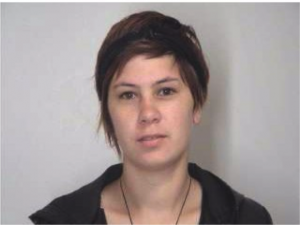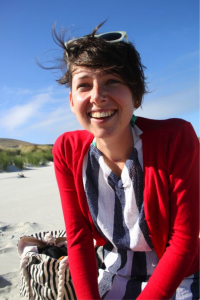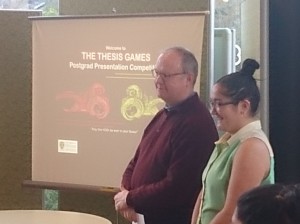10 questions with . . . Lyn Carter.
The Association of Social Anthropologists of Aotearoa/New Zealand recently conducted a ’10 questions with’ session with Te Tumu’s Lyn Carter about her newly released book Indigenous Pacific Approaches to Climate Change: Aotearoa/New Zealand on their blogsite. Click here to read all about it.
Te Tumu Graduates in May 2017
Eight Te Tumu students graduated in the May ceremonies last weekend.
Hine Te Ariki Parata-Walker (Ngāti Porou, Ngāi Tahu) completed a Master of Indigenous Studies (MIndS). Her research topic, supervised by Professor Paul Tapsell, investigated procedures around hahunga (the exhumation of ancestral remains) in modern times. Select Parata-Walker abstract for further details.
Karurangi Salu (Tainui, Ngāpuhi, Samoan) gained a BA(Hons) with her research, entitled “Māku anō tōku nei whare e hanga”, looked at how haka and waiata are used in teaching at Te Whare Kura o Rākaumanga to pass on Tainui history, reo, tikanga and whakapapa. Dr Karyn Paringātai supervised. Select Salu abstract for further details.
Rieko Hayakawa also graduated with a PhD in Pacific Islands Studies.
Congratulations also to our BA graduates.
Alice Anderson (Ngāi Tahu), BA in Indigenous Development/Te Kura Matanui.
Luaipouamalo Gafa (Samoan), BA in Pacific Islands Studies.
Maiora Puketapu-Dentice (Te Āti Awa, Tūhoe), BA in Māori Studies and History.
Tataioterangi Reedy (Ngāti Porou, Te Whānau a Apanui), BA in Indigenous Development/Te Kura Matanui.
Roma Simmons-Donaldson (Ngāti Porou, Taranaki, Tainui, Ngāti Tūwharetoa), BA in Māori Studies.
Te Tumu Research Roundup
Te Tumu staff have been active with research in the first half of the year. The highlights (listed below) show the depth and diversity of the research undertaken at the School.
In April Te Tumu hosted a three-day conference, Te Kura Roa: Minority Language & Dialect Conference, that attracted a number of speakers, from within New Zealand, as well as from USA, Tahiti, Australia, Scotland and Israel. Poia Rewi was the driving force behind this conference, a collaboration between the University of Otago, Victoria University and Ngā Pae o te Māramatanga. Suzanne Duncan was the key organiser, ably assisted by a number of students.
In May Te Tumu celebrated its 25th Anniversary, in conjunction with the Māori Centre’s anniversary. Events were organised by a committee headed by Karyn Paringatai and Suzanne Duncan. Of particular note was a one-day symposium at which a number of Te Tumu alumni presented on where their university educations had taken them.
In July, the book “The Lives of Colonial Objects” was published by Otago University Press, comprising a number of short essays on particular objects. Four Te Tumu staff contributed chapters: Megan Pōtiki on a tokotoko held by her whānau; Paerau Warbrick on a Māori Land Court Minute Book; Pāora Tapsell on the Te Haupapa cannon at Maketū; and Lachy Paterson on a press used to print a Māori-language newspaper in the 1860s. Also in this volume is a chapter by Michael Stevens, a former Te Tumu post-doc, on his whānau’s kahukiwi.
Pāora Tapsell, Poia Rewi and Tangiwai Rewi were on Research and Study Leave in Semester 1, with Matiu Ratima, Jim Williams and Michael Reilly away for Semester 2. Pāora Tapsell has recently returned from Vienna, having given a keynote address “Waka Wairua: Imagining an Other way of knowing our Pacific” at the New Zealand Studies Association conference. Matiu Rātima was awarded the Fulbright-Nga Pae O Te Maramatanga Scholar Award; this allows him to spend time at the University of Hawai’i to observe the teaching of Hawaiian languages.
In May, Megan Pōtiki published an article in the New Zealand Journal of History, 49, 1 (2015) on the Māori-language writings of H.K. Taiaroa and Tame Parata, and in June presented at a paper at the 4th International Conference on Language, Literature and Linguistics in Singapore on the use of old manuscripts as a means of revitalizing Kāi Tahu reo. Megan is writing this up for publication at present.
In February, Lachy Paterson gave a Waitangi Day at the Dunedin Art Gallery on past, present and future perceptions of the Treaty of Waitangi. As he didn’t have any teaching duties in Semester 1 he was able to travel to Canada in February/March where he gave a number of talks at the University of Alberta and University of Manitoba on ‘Indigenous Literacy and Literacy Practices: Māori in the 19th Century’ and (with Angela Wanhalla) ‘Indigenous Women, Writing and Colonialism’. In April he presented at a conference on colonial print media at the University of Cambridge, UK.
In June Jenny Bryant-Tokalau presented a paper entitled ‘New Communities and the State in Suva, Fiji’ to the Urban Melanesia theme at the European Society for Oceanistes Conference (ESFO), in Brussels. The paper will be published in a special edition of the Journal de la Société des Océanistes in 2016.
Tangiwai Rewi has recently published an article in the Journal of the Polynesian Society, 124, 1 (2015) on ‘The Ngāruawāhia Tūrangawaewae Regatta: Today’s Reflections on the Past’. Click here to access.
In February, Michelle Schaaf presented on ‘The role of family in Pacific migrant participation in physical activity and sport’ at the Inaugural International Conference on Migration Social Disadvantage and Health, in Melbourne.
Merata Kawharu and Karyn Paringatai both spoke at at Hui Poutama 2015: Māori Research Sympoisum in May. Hui Poutama is the University of Ōtāgo’s biennial symposium of Māori research. Karyn’s talk was on ‘The value of the dark: The students’ perspective’, and Merata Kawharu’s on ‘Entrepreneurship: the relevance of a customary context. A Ngāti Whātua narrative’.
Karyn Paringatai‘s research on teaching in the dark is in demand. She presented at a recent Pecha Kucha event at the Dunedin Public Art Gallery, and in July gave a keynote presentation at the Tuia Te Ako hui at Lincoln University.
Lyn Carter has two works in press: ‘Climate Change and Aotearoa New Zealand: A review’, a journal article with Wiley Interdisciplinary Review (LSE); and ‘Iwi are where the People are: Rethinking Ahi Kā and Ahi Matao in Contemporary Māori Society’ in the forthcoming Huia Publishers book, Home. Here to Stay!
Finally, Te Tumu is revamping its MAOR 102 textbook. The old book, Ki te Whaiao: An Introduction to Māori Culture and Society was published in 2004, and while it had served its purpose well, staff felt that a new volume was necessary. As with Ki te Whaiao, Te Tumu staff are doing most of the writing for this new book.
Recent Te Tumu theses
Te Tumu had a number of its students honoured at the university’s recent Graduation, including several doing post-graduate research.
Samantha Jackson, “Ko Te Houhanga a Rongo marae tōku tūrangawaewae: In search of a philosophical standing place for indigenous development”, (MA Indigenous Development).
Supervisors: Professor Grant Gillett, Associate Professor Merata Kawharu, Dr. Paerau Warbrick
Abstract: Dominant paradigms of development assume a linear progression from one established point to another. These paradigms do not take into account the complexity of indigenous voice, spirit and ways of being-in-the-world, leaving indigenous peoples without a meaningful place to stand. To approach the question of indigenous development in such a straight forward manner is a methodological error which stands to obscure meaningful indigenous development and silence the indigenous spirit.
In order to appropriately investigate the question of indigenous development, I argue we must awaken ourselves to our assumptions which form the background of how we view and understand ourselves, the world and others. I draw on Martin Heidegger’s interrogation of Cartesian thought to provide a space through which indigenous development can be meaningfully approached from a tangata whenua (Māori, people of the land) philosophical perspective.
I utilise the traditions and teachings of Reverend Māori Marsden to posit a meaningful model of indigenous development must be rooted in Te Ao Mārama traditions (Māori worldview), a woven universe of connection between self, ancestors, universe and gods. This idea is mooted in an international indigenous context, before returning to the traditions pertaining to Te Houhanga a Rongo marae (Māori cultural complex), my own tūrangawaewae (place to stand). I argue marae are a manifestation of Te Ao Mārama worldview and therefore an appropriate site to investigate indigenous development. I utilise whakapapa (genealogy) and kōrero pūrākau (stories of origin) as important mechanisms through which one can come to understand and organise the relationship between a person, their world and their gods. Maintaining an intimate relationship within the woven universe validates a person’s tūrangawaewae giving them the ‘sureness of touch’ of a person firmly rooted in belonging with unlimited potential for human development.
Nicole McCrossin, “Intention and Implementation: Piecing Together Provisions for Māori in the Resource Management Act 1991″, (MA, Indigenous Development)
Supervisors: Dr Janet Stephenson and Dr Jenny Bryant-Tokalau
Abstract: Today, it is widely recognised that indigenous people have a valuable contribution to make to the development and practice of resource management. New Zealand legislation recognises in part the importance of Māori participation; however, there appears to be a considerable gap between the recognition of these rights and their effective and widespread implementation at ground level. This study explores the intentions behind, and the implementation of Section 33 transfers of power and Sections 36B-E joint management agreements, under the Resource Management Act 1991, which support Māori participation in resource management decision-making. These provide for the devolution of power from local authorities to iwi authorities and the establishment of agreements to co-manage resources with iwi. A nationwide survey of local authorities’ use of the provisions demonstrated that they had been virtually unused. The majority of local authorities do not have any form of co-management agreements with Māori, and those that do have quite constrained arrangements which are designed to enhance consultation, rather than shared decision-making. The results of the survey are contrasted to findings from a series of semi-structured interviews with key informants involved in the crafting of the RMA, which examines the intentions behind the inclusion of these mechanisms in the legislation. The concept of institutional bricolage is used to help explain their creation and implementation, and the subsequent negotiation of the mechanisms and their alternatives by councils. The survey and interview results revealed that an intentional institutional bricolage approach was frequently employed by councils and iwi to negotiate co-management arrangements, but was not used in the crafting of the RMA co-management provisions. Instead, the provisions were a result of unintentional institutional bricolage, drawing on a range of structural and social influences.
Inaugural Te Tumu Postgraduate “Thesis Games”
We all know how difficult it can be to talk about our research, particularly when we have to do it succinctly. Te Tumu’s postgrad students were put to the test today with our first inaugural “Thesis Games”, with each presenting their research within about three minutes.
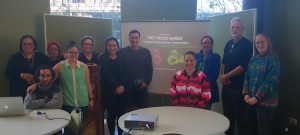
Click to enlarge. From left, Tangiwai Rewi, Hori Barsdell, Lana Arun, Gianna Leoni, Marcelle Wharerau, Ane Tatu, Tyson Tautari, Suzanne Duncan, Tawini White, John Birnie, Marsa Dodson.
The topics were many and varied: Tawini White: “He Manawa Hapū” (on hapū identity in Te Rarawa); Tyson Tautari: “Dogs Tale” (on the Polynesian dog); Ane Tatu: “Are you Dongan or Tongan? An examination of the ways in which New Zealand born and raised Tongans self-define and experience anga fakatonga (the Tongan way of life) and being Tongan”; Hori Barsdell: “What is the Significance of Pā Today?”; Lana Arun: “Archaeology and Tikanga” (on how Māori knowledge fits into the archaeoly profession; Marcelle Wharerau: “You Maaris get everything” (on perceptions of Māori privilege at university); Tangiwai Rewi: “Maaku anoo e hanga tooku nei whare…” (on intergenerational knowledge transfer within Waikato); John Birnie: “What if the mountain won’t come to Mohammed? Learner-centredness for adults learning te reo Māori”; Marsa Dodson: “Mixed blessings: Oral Histories of the War Children Born to US Servicemen and Indigenous Cook Islanders”; Gianna Leoni: “Power to Policy” (on the use of te reo Māori within government departments); and Suzanne Duncan: “Where is the whanau?” (on whānau involvement within the Māori economy).
There was a great turnout of people, including a number of Te Tumu under-graduates. All the speakers were amazing and engaged the audience. Congratulations to the winners: Ane Tatu for Honours level, Marcelle Wharerau for Masters Level, and Gianna Leoni for PhD level.
Such was the success, Te Tumu is sure to hold another such event next year. There is even talk of something similar for staff.
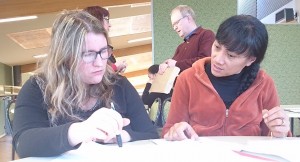
Special thanks to our judges, Shiobharn Smith, Māori, Pacific & Indigenous Subject Librarian, and Esme Eteuati, Pacific Islands Student Support Officer (Humanities).

